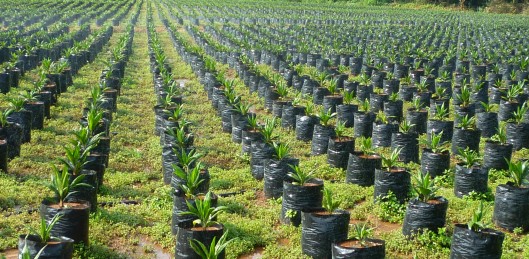For the ecologically conscious shopper, hunting for yummy chocolate Easter eggs, or for that matter any product, have always been a bit of a challenge. However, this is likely to get a little easier, thanks for new labelling laws and a change of perception and attitudes of palm oil manufacturers.
From December 2013 onwards, the European Union has passed laws that make it mandatory that palm oil be declared on the product label. Earlier it used to appear on the label, but was included as generic vegetable oil. So those who were extra keen on avoiding it, had to play detective.
Environmental groups which once used to be very vocal and used to spearhead campaigns against the palm oil industry now seem to be backing it.
From December 2013 onwards, the European Union has passed laws that make it mandatory that palm oil be declared on the product label. Earlier it used to appear on the label, but was included as generic vegetable oil. So those who were extra keen on avoiding it, had to play detective.
Environmental groups which once used to be very vocal and used to spearhead campaigns against the palm oil industry now seem to be backing it.
“We knew a boycott wasn’t the right solution. The trick is to cut the link between palm oil and the unacceptable impacts rather that cut it out,” says Adam Harrison, a senior policy officer for food and agriculture at WWF.
He goes on clarify that those who are opposing it should rethink their strategy since palm oil’s yields are as much as four times that of rapeseed and require a tenth of the pesticides and fertilizers needed for Soya beans. “That’s why we helped set up the Roundtable for Sustainable Palm Oil (RSPO) in 2004. It has standards on all those unacceptable impacts and addresses them as a package rather than individually,” clarifies Harrison.
Amongst the constituents of the 1700 strong RSPO’s members are the big four global confectionaries: Mondelez International of Cadbury’s fame, Nestle, Mars and Ferrero. The 1700 strong pack consisting of manufacturers, NGOs and producers have not only made all efforts to verify and ensure that they only source palm oil from who have sustainable practices but also that the same can actually be traced back to the mill from which small farmers buy from. Their efforts essentially boil down to Certified Sustainable Palm Oil (CSPO) sourcing throughout the supply chain. Last year saw Ferrero shift its entire supply chain to 100% segregated sustainable palm oil, for the entire range of its product line.
Chocolate brands such as Sprungli and Lindt have come at the bottom of the sustainable palm oil initiative. However, they are now in the process of transforming this area of operation so as to be CSPO certified.
“Our minimum sourcing standard is RSPO-certified palm oil. By the end of 2015 we will be shifting the whole production chain to CSPO segregated palm oil. [It’s] already been initiated and implemented stepwise in several of our production sites and for several products,” says Lindt and Sprungli’s head of corporate communications, Sylvia Kälin.
Critics however say RSPO certification for a company is an eye wash and does not ensure that their entire supply chain is in fact RSPO certified. They are now demanding that they further certify that their products do no harm rainforests or are not at the expense of deforestation.
“RSPO certification isn’t at present a guarantee that the palm oil used in Easter eggs is deforestation free. Companies using palm oil to produce chocolate or other consumer goods need to go beyond RSPO standards to ensure their products are rainforest friendly,” says Pat Venditti, forests campaigner for Greenpeace International. On its part Greenpeace is trying to ensure that secondary forests are also protected and not just the primary high value conservation ones from which palm oil is sourced.
“The expansion of plantations into peatland is one of the leading causes of greenhouse gas emissions in Indonesia. The members of the RSPO voted to block a ban on expansion into peatlands in 2013, which tells you loud and clear that they’re more interested in protecting their profit margins than they are in mitigating climate change, or committing to any meaningful sense of sustainability,” says Tom Johnson, Forest Campaigner from the Environmental Investigation Agency.
On its part, RSPO admits that there are areas for improvement. Danielle Morley, the European Director for outreach and communications, says that there are some RSPO members are only partially compliant since their entire supply chain is not covered under RSPO certification. But these are limited to only “… small companies, like speciality ingredient manufacturers, are maybe still unable to source the derivative that they need sustainably.”
Recently 15 memberships have been cancelled and 61 companies have been suspended for want of submission of annual reports for three consecutive years. This only goes to show that RSPO knows it has to police its members if it wants to remain credible in the industry.
While it may be put forth that the palm oil industry’s environmental credentials are being redeemed through RSPO certification, but labeling it on the product raises too many doubts in the mind of the consumer regarding the health benefits and its quality. Labeling the usage of palm oil in products, may to promote more confusion and send complicated messages, which are better side stepped than brought into public eye.
References:
http://www.theguardian.com/sustainable-business/2015/mar/27/chocolate-palm-oil-easter-egg-nestle-mars-lindt-cadbury-ferrero






